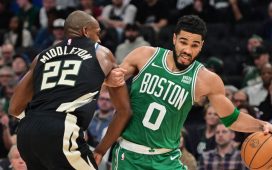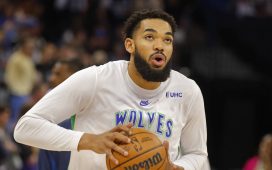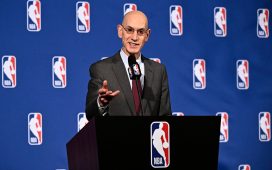For the first several years of his career, everyone loved the guy. Russell Westbrook had his detractors, sure; Skip Bayless famously contended that Eric Maynor was a superior option for the Oklahoma City Thunder at point guard. More reasonable people also had their own fair concerns about whether he could ever calm down, and consistently maintain the bare minimum care threshold for elite point guards of a 2/1 assist-to-turnover ratio. There was no question about the watchability before us, though: Westbrook was a one-of-a-kind force, treating every play like a punt return touchdown run, with a rare and insane athleticism that justified this perma-blitzkrieg mode.
As a contrast to the smooth and ethereal classic scoring touch of Kevin Durant and James Harden’s perimeter dancing wizardry, Westbrook’s charging style made for a unique, delicious basketball ingredient in the most exciting young team the sport had seen since Shaquille O’Neal and Penny Hardaway’s Orlando Magic rocked the league in the mid-90’s. We all know what happened next: Harden was traded, the Thunder nearly won a title in 2016, and then Durant’s shocking defection to the Golden State Warriors launched Westbrook into one of the most defiant MVP runs ever, in the 2016-17 season.
It’s an odd truth, but when Westbrook reached the individual zenith of his sport is also when the warts in his game started to most brutally show. After eclipsing that all-important 2.0 care rate in the 15-16 season, he dipped back under it by averaging 5.4 turnovers during his most prized year. He also shot 7.2 three-pointers per game at a mere 34 percent, falling beneath the wisdom barrier that divides players who should and should not embrace volume opportunities from beyond the arc. Both numbers were bad signs for an offense ran by the guy, as were his 24 shots per game on just 43 percent shooting from the field.
It didn’t quite matter, though. Not then, anyway. By frequently saving his best for the ends of games in an inspired 47-win season for a team devastated by the unaccounted for loss of an all-time great player, Westbrook captured the heart of the NBA. His gobsmacking raw numbers didn’t hurt, either: the man averaged 31.6 points and a triple double!
It’s all been downhill from there, though: Westbrook has not come close to walking that frighteningly thin line between superstar and unsightly volume hog, and his value as a clutch-time player has dramatically reversed. Now one of the most damaging ending minutes players in the sport, his fates there turned as soon as the 2017 playoffs began—on the eve of receiving his MVP trophy, Westbrook flamed out in the first round while taking nearly 10 threes per game, making below 27 percent of them; he shot 39 percent from the field while taking over 30 shots a game, and averaged six turnovers as his Thunder fell 1-4 to the Houston Rockets.
I can hear you from here, screaming at me about how little help Westbrook had on that team. You’re right, and that’s why he won his trophy, but there’s no mistaking how the uglier details presaged a gradual, then sudden decline to where he is today. The Los Angeles Lakers’ beleaguered point guard is one of the biggest albatrosses in the league, dynamic yet aimless as he makes a salary so large that it just might wall off all of LeBron James’ paths back to the promised land of the NBA Finals.
The Lakers now contemplate moving Westbrook for John Wall, his brother in a two-mean realm of super-max point guards who create strange paradoxes for their franchises, and who might become mutually stuck in a feedback loop of being traded for each other, by different teams every other year or so. Wall’s situation is odd like Westbrook’s is, but there is also more dignity to it: as a Houston Rockets castaway, it is known that he would prefer to be on the floor playing meaningful basketball, but it’s also clear that he has no real role in a scorched-earth youth project. In his exile there is frustration, but there is also plenty spared. Westbrook, on the other hand, is the painfully flailing post-prime guy mucking up what should be a title contender, and what should be a franchise making the most of arguably the greatest 37-year-old hooper we’ve ever seen.
The indignity that currently defines the career of the 2017 MVP is a perhaps unseen thing in the NBA. This has a lot to do with how relentless Westbrook is; formerly his greatest quality, the 33-year-old’s refusal to ever stop going in is now a nightly difficulty for NBA fans to behold. Like the protagonist of a revisionist Western, the kinds they made when people were ready to question just how heroic John Wayne really was, Westbrook is a fading hero struggling to move onto a new story, a man out of time and out of scene—seemingly trapped in his own replaying movie, one that everybody else has already stopped watching. Try as he has to reinvent himself for LeBron’s Lakers, his inertia toward his classic one-man army act (one that, it should be noted, he perfected) is stronger, and we are faced with an athlete who appears unable to change in the requisite ways, on one of the biggest stages. It is nothing short of basketball tragedy.





